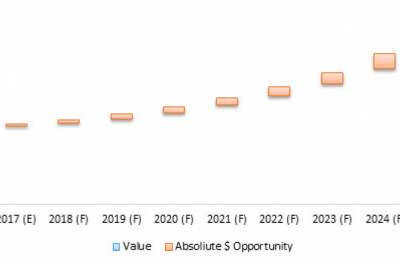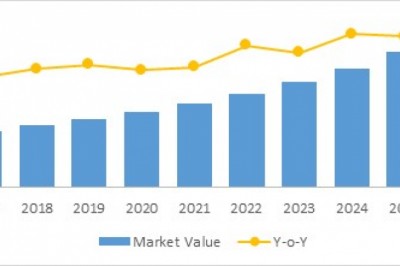views

Phosphorus & Derivatives market size is forecast to reach US$69.2 billion by 2026, after growing at a CAGR of 3.1% during 2021-2026. The industry's rapid expansion is owing to rising demand from industries such as fertilizers, detergents, the food sector, water treatment chemicals, metal finishing, and halogen-free flame retardants. The factors which are primarily driving the demand for phosphorus & derivatives such as phosphorus tribromide, phosphorus pentachloride, adenosine triphosphate, ammonium phosphate, purified phosphoric acid are increasing demand for water treatment, as well as the development and adoption of halogen free flame retardants (HFFR) and the use of biofuels. Furthermore, the global market is also growing due to a decrease in arable land and an increase in demand for essential nutrients for body function. The rapid growth of the agriculture industry has also increased the demand for fertilizers; thereby, fueling the market growth. The market is constrained by several variables, including phosphorus usage restrictions in detergents, resource conservation, and deteriorating phosphate rock quality.
COVID-19 Impact
Most industries were hit by the global crisis caused by the COVID-19 epidemic, although the fertilizer business exhibited some resilience in the supply chain during the crisis, i.e. the industry was only partially affected. The use of fertilizers increased vastly. The overall fertilizer nutrient demand was estimated to be around 20 million tonnes in 1950, compared to over 190 million tonnes in 2019 and 2020 (International Fertilizer Association (IFA)), and it is likely to continue to rise in the future, as an annual application is required to maintain yields. Because of the uncertainty created by the COVID-19 pandemic, forecasting growth for the 2020–2021 agricultural year and beyond may be more difficult than usual. Most world economies were forced to follow government-imposed measures, causing disruptions in the food chain and supply networks, which impacted the fertilizer industry.
Phosphorus and Derivatives Market Segment Analysis – By Type
The ammonium phosphate segment held the largest share of more than 25% in the phosphorus & derivatives market in 2020 and is growing at a CAGR of 3.5% during 2021-2026. Ammonium phosphate is used in many different areas. One of these is its incorporation in many commercially baked products. In addition, it has been instituted as an effective fertilizer, with good water solubility and rapid dissolving abilities. It is a crucial mineral for the healthy and sustained growth of plants. Fertilizers containing ammonium phosphate also aid in the addition of nitrogen to the surrounding soil, which aids growth and root development even more. Because of its solubility, it can be released quickly into the soil, which is beneficial to newer plants and plants in need of resuscitation. Ammonium phosphate is also used in dry chemical fire extinguishers, which is a lesser-known but equally essential application. This application uses monobasic ammonium phosphate, which coats the fuel source and efficiently smothers the flames when sprayed over the fire. In a similar vein, it's used as a component in halogen-free flame retardant-required applications. As a result of these numerous applications, ammonium phosphates have a significant market share in the phosphorous and derivatives business.
Request for Sample Report @ https://www.industryarc.com/pdfdownload.php?id=11736
Report Price: $ 4500 (Single User License)
Phosphorus and Derivatives Market Segment Analysis – By Application
The fertilizers segment held the largest share of more than 35% in the phosphorus & derivatives market in 2020 and is growing at a CAGR of 2.9% during 2021-2026. Phosphorus is key to plant wellness. It aids in the growth of roots and blooms, as well as allowing plants to resist environmental stress and hard winters. It is a key nutrient for encouraging root growth in all plants, as well as improving disease resistance and helping to fortify the plant for the winter. It also enhances flower creation and seed production, among other things. Photosynthesis, respiration, energy storage, and transport, and a variety of other processes in plants all require phosphorus. In both granular and liquid forms, ammonium phosphate and its derivatives are widely employed as fertilizers. Phosphorus is necessary for seed production and improves the quality of fruit, vegetable, and grain crops. In reality, phosphorus (together with nitrogen) is one of the most limiting elements in soils, capable of limiting plant growth due to phosphorus deficiency. Plant growth can be hampered by phosphorus deficiency. Thus, the demand for phosphorous & derivatives is continuously increasing.
Phosphorus and Derivatives Market Segment Analysis – By End-Use Industry
The agriculture segment held the largest share in the phosphorus & derivatives market in 2020 and is growing at a CAGR of 4.3% during 2021-2026. An input of phosphorus such as phosphorus tribromide, phosphorus pentachloride, adenosine triphosphate, ammonium phosphate, and purified phosphoric acid is crucial for food production since all plants need an adequate supply of it for successful growth. Phosphorus (P) is a vital component of plant and animal growth and is required for profitable agricultural and livestock production. For instance, it is essential for seed production, promotes increased root growth, promotes early plant maturity (less time for grain ripening), promotes stalk strength, promotes resistance to root rot diseases, promotes resistance to winter kill, and more. Thus, A shortfall in phosphorus will result in a reduction in crop yield. Phosphorus is essential for all living organisms. The sole known primary supply of phosphorus, mined rock phosphate, is intensively used in agriculture. Crop fertilization accounts for the majority of the phosphorous utilized in agriculture. Due to the decrease of phosphorus in crop and hay-growing soils in recent decades, phosphorus use has become more common. As a result of the enormous need for phosphorous for proper crop yield, the demand for phosphorous and derivatives is surging in the agriculture sector.
Phosphorus and Derivatives Market Segment Analysis – By Geography
Asia-Pacific region held the largest share in the phosphorus & derivatives market in 2020 up to 37%, owing to the expanding agriculture sector in the region, which is accelerating the demand for fertilizers in the region. According to the Australian Government Department of Agriculture, Water, and the Environment, The gross value of agricultural, fisheries, and forestry production in Australia has increased by 7% in the past 20 years in real terms (adjusted for consumer price inflation), from approximately US$62 billion in 2000–01 to US$67 billion in 2019–20. According to the India Brand Equity Foundation (IBEF), Foodgrain production hit a new high of 296.65 million tonnes in the 2019-20 crop year. India's horticulture crop production would reach a new high of 319.56 million metric tonnes (MMT) in FY20. India's government plans to produce 298 million tonnes of food grains in 2020-21. According to the International Trade Administration (ITA), After Indonesia, Malaysia is the world's second-largest producer and exporter of palm oil. In 2019, Malaysia's palm oil production accounted for 28% of global production and 33% of global exports. Because more acreage for palm oil production isn't accessible, any growth in national production will have to come from increased yield and productivity. And fertilizers play an important role in providing crops with the nutrients they need to grow and enhance crop yield, owing to which there is an increasing demand for fertilizers in the region. With the increasing crop production, the demand for fertilizers will also eventually increase, which will drive the demand for phosphorous & derivatives in the region to manufacture fertilizers.
Phosphorus and Derivatives Market – Drivers
Increasing Steel Production drive the market growth
In the phosphating of metal surfaces, purified phosphoric acid and phosphates such as phosphorus tribromide, phosphorus pentachloride, adenosine triphosphate, and ammonium phosphate are utilized. This procedure decreases the chance of metals corroding, electrically insulates them, and stimulates paint adhesion to the treated surface. Phosphorus is also utilized as a steel addition to improving machining qualities and resistance to air corrosion. Phosphorus is one of the most effective ferrite solid-solution strengtheners. According to the World Steel Association, the United States produced 7.7 million tonnes of crude steel in January 2020, up 2.5 percent from January 2019. Germany's crude steel production climbed from 39.7 million tonnes in 2018 to 42.4 million tonnes in 2019. Saudi Arabia produced 4.8 million tonnes of crude steel in 2017, which increased to 5.2 million tonnes in 2018. With the rise in steel production, demand for phosphoric acid is expected to rise significantly, propelling the industry forward.
Surging Demand for Lead-Acid Battery
Because of their low cost, mature technology, and high recycling efficiency, lead-acid batteries are a popular choice for hybrid electric vehicles (HEVs) and energy storage applications. However, due to the production of irreversible hard sulfate in the negative plates, the typical valve-regulated lead-acid (VRLA) battery has a reduced cycle life under high-rate partial-state-of-charge (HRPSoC) circumstances. Phosphorus-doped activated carbon (P-AC) is being used to solve this problem. When a tiny amount of phosphoric acid is added to 5 M H2SO4 (the commercial electrolyte for lead-acid batteries), it has several beneficial impacts on the reactivity of the batteries. Plug-in hybrid electric vehicle (PHEV) models became widely accessible on the market around 2012, according to the International Energy Agency (IEA), and by 2019 they accounted for around one-third of the worldwide electric vehicle stock. China (40 percent of global sales) and Europe remain the two most important markets (36 percent). In 2019, plug-in hybrids accounted for 36% of all-electric vehicles sold in Europe and 21% in China. As a result, as the production and sales of hybrid electric vehicles grow, so does the need for lead-acid batteries, which is propelling the industry forward.
Inquiry Before Buying @ https://www.industryarc.com/reports/request-quote?id=11736
Phosphorus and Derivatives Market – Challenges
Hazardous Impacts of Phosphorus & Derivatives
Although phosphorus has obvious benefits for agricultural production, it can become pollution if it escapes the site. Phosphorus transmission from soils to streams, rivers, lakes, and finally the seas is a major concern. Phosphorus transferred from agricultural soils can cause eutrophication, which is nutrient enrichment that results in increased algal bloom and lowers dissolved oxygen levels. Furthermore, too much phosphate can be harmful. An overabundance of the mineral can lead to diarrhea, as well as organ and soft tissue stiffening. Phosphorus deficiency can impair the body's capacity to use other minerals like iron, calcium, magnesium, and zinc. Mineral deposits can occur in the muscles when it combines with calcium. All of these potentially harmful effects of phosphorus and derivatives are limiting the market growth.
Phosphorus and Derivatives Market Landscape
Technology launches, acquisitions, and R&D activities are key strategies adopted by players in the phosphorus & derivatives market. Phosphorus & derivatives market top companies are OCP S.A., Agrium Inc., BASF SE, Mosaic Co, Eurochem, Yara International ASA, Innophos Holdings Inc., Akron OAO, CF Industries Holdings, Inc., Israel Chemical Ltd., Lanxess AG, and United Phosphorus Limited.
Acquisitions/Technology Launches
In September 2020, for Asian markets, BASF has produced an improved Red Phosphorus polyamide grade. In comparison to conventional materials, BASF has expanded its product range for industrial and transportation applications with this innovative offering. Because of its exceptional mechanical performance and great flame-retardancy with a PH release value of less than 20ppm, the new Red Phosphorus grade is now considered one of the best-in-class materials.
Key Takeaways
Asia-Pacific dominates the phosphorus & derivatives market in 2020, owing to the increasing electrical & electronics industry in the region, which is accelerating the demand for halogen free flame retardants. According to Invest India, the domestic electronics market in India to attain US$400 billion by 2025.
Phosphorus is required for the development of plants. It is ideal for application in the initial stages of crop growth as phosphorus is very important for the development of a proper root system, which is also driving the market growth.
A paradigm shift to halogen free flame retardants from halogenated flame retardants such as organophosphorus flame retardants is positively impacting the phosphorous & derivatives market growth.
Related Reports
A.Phosgene & Its Derivatives Market
https://www.industryarc.com/Report/11736/phosphorus-derivatives-market.html
B.Chemical Intermediates Market
https://www.industryarc.com/Report/1269/Chemical-Intermediates-Market-report.html
For more Chemicals and Materials Market reports, please click here












